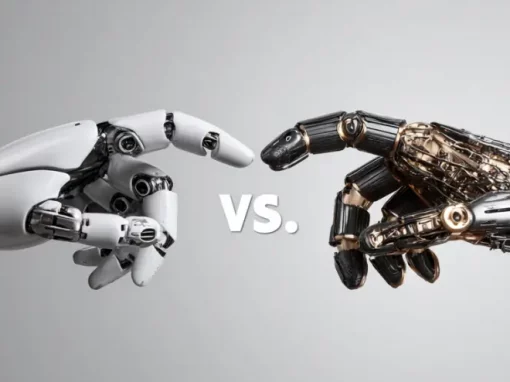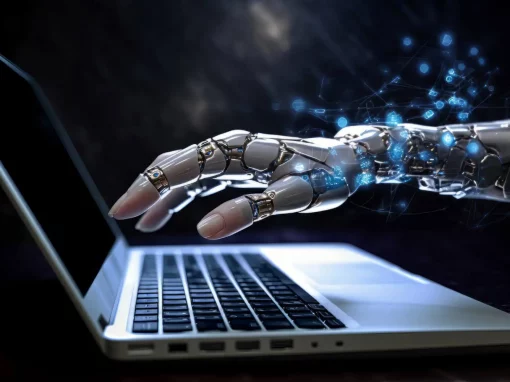Table of Contents
AI trading is spreading like wildfire. More and more AAA-level financial companies are adopting machine learning for algorithmic trading strategies to maximize their returns. Over 60% of trades worth more than $10M were executed using algorithms, according to a 2020 JP Morgan Report. his rapid adoption is also driving demand for financial software custom development, as firms seek tailored solutions to meet their unique trading and compliance needs.
So, what makes AI trading so unique? With AI trading, anyone can start trading stocks quickly using reliable and dynamic models of risk assessment. You can automate your entire trading process without any human interference. Curious to learn how AI trading is shaping the world of finance? Read on!
What is Algorithmic Trading?
Both traditional algorithmic trading and AI trading are trading solutions that execute trades at a rate times faster than what a typical human trader could do. The difference is: AI trading takes its automation capabilities to a whole new level.
In traditional algorithmic trading, programmers need to create a set of if/then rules that govern the trading process. The problem here is that the systems cannot learn on their own. You need to feed your computer a set of instructions to follow constantly. This makes the whole trading process highly manual and slow. Worst of all, you rely on your judgment when creating algorithms, which creates too much space for human error.
On the other hand, AI trading is about employing machine learning development services in an attempt to adjust to ongoing market changes proactively. With AI trading, you can turn on the machine and let it update the algorithms automatically, handling all the transactions on its own. It learns from what’s happening in the market – one of the most reliable benchmarks when it comes to decision-making.
What’s the Difference Between AI Trading and Algo Trading Solutions
Revolutionary engineers build AI trading systems to provide risk reduction in times of high volatility. To this extent, AI trading solutions are constantly evolving, dynamic, and fully automated. AI trading eliminates the human factor from the equation, taking only existing data and trends into consideration when the algorithm adjusts. This enables millions of investors worldwide to make informed decisions more effectively and even automate their trading workflows.
On the contrary, traditional algorithmic systems abide by a pre-defined set of rules. First, such models require constant interaction with the trader to adjust to the market conditions effectively. Second, traditional algorithms are created by programmers, quant strategists, and data analysts who are expensive to hire. Third of all, such models are subject to human error since people program them.
As soon as you create an AI trading solution and put it up and running – the trading system will start learning from gigabytes of data exchanged on the stock market consistently. “It’s about building a trading venue that can adapt to a changing environment,” said Roman Ginis, CEO of Imperative Execution.
AI Trading and Machine Learning Use Cases in Finance
Thousands of companies worldwide are using machine learning powers to bring their AI trading solutions into existence. But what are some of the most exciting companies employing the benefits of AI in trading applications nowadays? Let’s take a closer look at 4 of our favorite ones:
- Trading Technologies: TT is an AI platform that identifies complex market patterns using a robust machine learning algorithm. It works across multiple markets, and they provide their clients with ongoing custom assessments of compliance risks executed with the help of a machine learning algorithm.
- Greenkey Technologies: GKT saves traders’ time by providing them with relevant financial information, news, notes, and data about the companies of their interest. It uses advanced machine learning algorithms to scour through and sort gigabytes of data in seconds.
- Morgan Stanley: That’s right. One of the world’s biggest financial powerhouses uses robo advisors powered by machine learning to guide their investors towards better-informed decisions.
- Kavout: This is an investment platform of the future. Kavout pairs machine learning algorithms and big data to give valuable insights about stock trading to their investors. Each asset on their web development platform is given a K score of 1 to 9. These risk scores empower investors worldwide to make informed decisions.
The use cases for AI in trading are various. But one thing is for sure – AI trading technologies will shape financial solutions development for years to come.
How is AI and Machine Learning Shaping the Future of Trading?
The bottom line here is that AI trading is superior to traditional algorithmic trading for many reasons:
- Complete lack of human interaction and 100% automation
- More efficient risk assessment based on constant analysis of gigabytes of trading data, and market trends
- Lack of human error
- Lower algorithm support maintenance costs
- Faster algorithm development
The usage of machine learning in trading is already helping millions of investors to enter the industry. On the investor end, AI trading makes the decision-making process simple, profitable, and automated.
At the same time, if you are a trader looking to develop trading software, AI can dramatically reduce the costs associated with developing and maintaining your algorithms.







